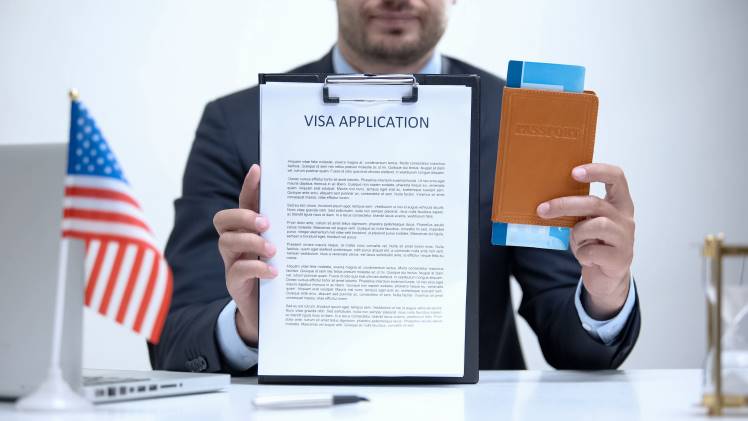Mastering the DS-260 Form: Your Ultimate Guide to Navigating the U.S. Visa Application Process

What is Form DS-260?
Form DS-260, also known as the Online Immigrant Visa Application and Alien Registration, is a U.S. Department of State form that is used by individuals who have received approval for an immigrant visa petition and are planning to apply for an immigrant visa at a U.S. consulate or embassy. This form is a critical part of the process for individuals seeking to immigrate to the United States.
The DS-260 form gathers information from the visa applicant and their family members (if applicable) to determine their eligibility for an immigrant visa. It includes personal, biographical, educational, and background information. The information provided on this form is used by U.S. government officials to evaluate the applicant’s eligibility, conduct security checks, and process the visa application.
Here are some key points about Form DS-260:
- Online Submission: The DS-260 form is submitted electronically through the Consular Electronic Application Center (CEAC) website, which is maintained by the U.S. Department of State.
- Required for Immigrant Visas: The form is typically required for individuals applying for family-sponsored or employment-based immigrant visas, diversity visas (DV Lottery), and some special immigrant categories.
- Case-Specific: Each applicant must complete their own DS-260 form, and the form is linked to a specific case number and Invoice ID provided by the National Visa Center (NVC) after the immigrant visa petition is approved by the U.S. Citizenship and Immigration Services (USCIS).
- Document Upload: The DS-260 form allows applicants to upload scanned copies of required civil documents such as birth certificates, marriage certificates, police certificates, and other relevant documents.
- Visa Interview: After submitting the DS-260 form and any required supporting documents, applicants are typically scheduled for a visa interview at a U.S. embassy or consulate in their home country.
- Important for Security Checks: The information provided on the DS-260 form is used for security and background checks to ensure that visa applicants are eligible and do not pose a security risk to the United States.
- Fees: There is usually a non-refundable visa application fee associated with submitting the DS-260 form. The fee covers the cost of processing the visa application.
- Accuracy Is Key: It’s crucial to provide accurate and truthful information on the DS-260 form. Any inconsistencies or false information could lead to delays or denials of the visa application.
The DS-260 form is an integral part of the U.S. immigrant visa application process, and applicants should carefully follow the instructions provided by the U.S. Department of State and the specific U.S. embassy or consulate where they plan to apply. Since immigration procedures can change over time, applicants are advised to refer to the official U.S. government resources and instructions for the most up-to-date information.
How to fill out Form DS-260
Filling out Form DS-260 is an important step in the process of applying for an immigrant visa to the United States. The form collects essential information about you and your family members (if applicable) and helps the U.S. government assess your eligibility for the visa. Here’s a step-by-step guide on how to fill out Form DS-260:
- Access the CEAC Website: Visit the Consular Electronic Application Center (CEAC) website. This is where you will fill out and submit Form DS-260.
- Log In: Use the case number and Invoice ID provided to you by the National Visa Center (NVC) to log in to the CEAC system. This links your application to your specific case.
- Start a New Application: Once logged in, select “IV Application” and then “Start Now” to begin a new DS-260 application.
- Personal Information: Enter your personal details, including your full name, gender, date of birth, place of birth, and nationality.
- Passport Information: Provide details about your passport, including the passport number, date of issuance, and expiration date.
- Address and Phone Information: Enter your current address, phone number, and email address.
- Family Information: Provide information about your spouse and any children you plan to bring to the United States with you.
- Work/Education and Previous U.S. Travel: Share details about your employment history, education, and any previous trips to the United States.
- Security and Background Information: Answer questions related to security, criminal history, and previous immigration violations.
- Medical and Health Information: Respond to questions about your health and any medical conditions you may have.
- S. Address: Indicate the address where you plan to live in the United States.
- Upload Supporting Documents: You will be asked to upload scanned copies of required civil documents, such as birth certificates, marriage certificates, police certificates, and other documents as instructed.
- Upload Photograph: Upload a recent passport-style photograph that meets the specified requirements for each applicant listed on the form.
- Review and Confirm: Carefully review all the information you’ve entered to ensure accuracy. Make any necessary corrections.
- Electronic Signature: Electronically sign the form to affirm that the information provided is accurate and truthful.
- Pay Visa Application Fee: Follow the instructions to pay the required visa application fee. This fee covers the processing of your application and is usually non-refundable.
- Submit the Form: After completing all the sections, uploading documents, and paying the fee, submit the DS-260 form.
- Confirmation Page: After submission, a confirmation page will appear. Print this page for your records.
- Prepare for Visa Interview: Once the DS-260 form is submitted and processed, you will be scheduled for a visa interview at a U.S. embassy or consulate in your home country. Make sure to bring the original documents you uploaded and any additional required documents to the interview.
Always refer to the official U.S. Department of State resources and instructions for the most accurate and up-to-date information about filling out Form DS-260.
What documents must be submitted with Form DS-260?
The specific documents required to be submitted with Form DS-260 can vary based on the type of immigrant visa you are applying for, your personal circumstances, and the specific instructions provided by the U.S. embassy or consulate where you will have your visa interview. However, here are some common types of documents that may be required:
- Civil Documents: These documents establish your identity, family relationships, and other important information. Examples include:
- Birth certificates for you and any accompanying family members.
- Marriage certificates or divorce decrees to prove marital status and relationships.
- Death certificates if applicable (e.g., if a spouse is deceased).
- Adoption decrees for adopted children.
- Police certificates from countries where you have lived for a certain period to prove your criminal record.
- Passports: You will need to provide a copy of your valid passport, as well as copies of passports for any accompanying family members. Passports should be valid for travel to the United States.
- Photographs: Recent passport-style photographs are required for each applicant listed on the DS-260 form. These photographs must meet specific size and quality requirements.
- Affidavit of Support (Form I-864): If you are applying for an immigrant visa based on a family relationship (such as a spouse, parent, or child), you may need to provide an Affidavit of Support from the petitioner in the United States. This form demonstrates that the petitioner has the financial means to support you.
- Proof of Relationship: Depending on your circumstances, you may need to provide additional documentation to prove your relationship to the petitioner or to other family members.
- Medical Examination Results: In most cases, you will need to undergo a medical examination by an approved panel physician. The results of this examination are submitted directly to the U.S. embassy or consulate by the physician.
- Court and Police Records: If you have been arrested or convicted of a crime, you may need to provide court and police records related to the incident.
- Military Records: If applicable, military records can demonstrate your military service and may be required for certain types of visas.
- Visa Photographs: Visa photographs are typically required for each applicant who will be traveling to the United States with you.
- Additional Documents: Depending on your specific circumstances and the visa category you’re applying for, there may be additional documents required. For example, employment-based visa applicants might need to provide job offer letters or educational transcripts.
It’s crucial to carefully review the instructions provided by the U.S. embassy or consulate where you will have your visa interview. They will provide you with a specific list of required documents based on your situation. Make sure to obtain certified copies or translations of documents if necessary, and keep both the original and copies of all documents for your records.
Always refer to the most current instructions from the U.S. Department of State and the specific U.S. embassy or consulate for the most accurate and up-to-date information regarding document requirements for Form DS-260.




